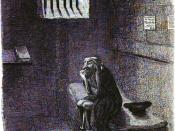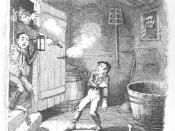"Oliver is a given name, also a surname, usually a male given name, derived from the Old French given name Olivier, which may signify "olive tree", though this may be a false etymology, and may be a corruption of a Germanic personal name, cognate with the Scandinavian name "Olaf" or "ÃÂlafur," which carries the meaning of "ancestor," "forbear," or "talisman"."1
The novel Oliver Twist is a criticism of the cruelty that children and poor people suffered at the hands of 19th century society. It was Dickens first novel written under his own name when he was 24 years old and in it he already reveals his sharp, but comic comments and criticism.
Oliver Twist is born into a world without love and pity for him. The 1st person narrator address Oliver as a "it" instead of a "him". He is generally quiet and shy rather than aggressive. Oliver's affectionate nature, along with his weakness and innocence, earn him the pity and love of the good people he meets.
Dicken's choice of Oliver's name is very revealing, because the boy's story is full of "twists" and turns. Dickens uses his skills at creating character to make Oliver particularly appealing. The boy itself is dehumanised and so Dickens draws this to our attention and suggesting how lowly his position in society is. A child of the parish "had contrived to exist upon the smallest possible portion of the weakest possible food, it did perversely happen in eight and a half cases out of ten, either that it sickened from want and cold, or fell into the fire from neglect, or got half-smothered by accident; in any one of which cases, the miserable little being was usually summoned into another world"2. Here Dickens shows how children were starved, neglected, inappropriately dressed, and mistreated.



Narrative
its actually a 3rd person omniscient, non-objective narrator. he clearly has bias towards certain characters. first person would be 'i' did this.
0 out of 0 people found this comment useful.